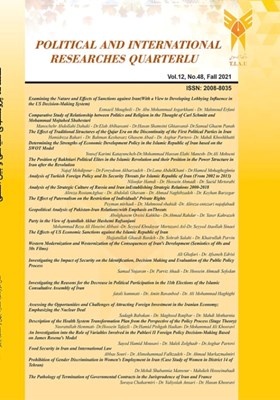Comparative Study of Relationship between Politics and Religion in the Thought of Carl Schmitt and Mohammad Mojtahed Shabestari
Subject Areas : Political and International Researches QuarterlyManochehr Abdollahi 1 , Elah Abl hassani 2 * , Hasan Shamsini Ghiasvand 3 , samad ghaem panah 4
1 - PhD Student in Political Science (Political Thought), Takestan Branch, Islamic Azad University, Takestan , Iran
2 - Assistant Professor, Department of Political Science, Takestan Branch, Islamic Azad University, Takestan , Iran,Corresponding Author
3 - Assistant Professor, Department of Political Science, Takestan Branch, Islamic Azad University, Takestan , Iran
4 - Assistant Professor, Department of Political Science, Takestan Branch, Islamic Azad University, Takestan , Iran
Keywords: Hermeneutics, relationship, Politics, Religion,
Abstract :
In discussing the relationship between religion and politics, thinkers of Islamic society and Western societies have proposed different theories, and in this study, the aim is to compare the theories of two thinkers, Carl Schmidt and Mohammad Mojtahed Shabestari. In Iran, since the Constitutional Revolution, the proponents of modernity and the proponents of tradition have disagreed on the relationship between religion and politics. One of the thinkers in this field is Mohammad Mojtahed Shabestari, whose views on religion and politics are based on the theory of segregation. He believes that religion does not dominate all areas of life. He seeks to liberate religious discourse. Carl Schmidt's hypothesis in this research is the continuation of the tradition of modernity, which in political theology introduces new approaches in Western thought and considers violence as an inherent thing in politics and expresses the relationship between religion and politics based on the theory of interference.
_||_

